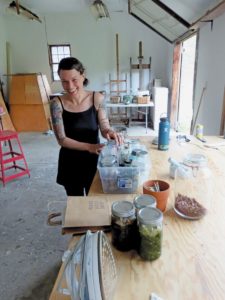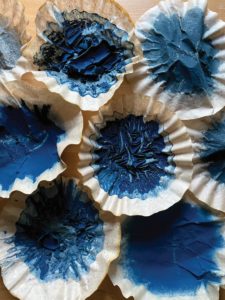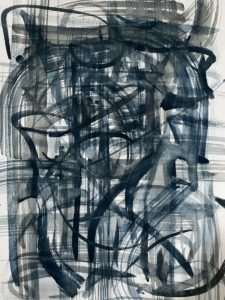Like many artists on the Outer Cape, Milisa Moses finds creative inspiration in the landscape. But Moses weaves the environment into her process as well as into her product. Moses will be teaching “The Alchemy of a Brushstroke: Painting with Tannins & Iron,” a three-day workshop at the Provincetown Art Association and Museum from Oct. 24 to 26.

“I work mostly with plants,” says Moses, who grew up in Belmar, N.J. and has been an Eastham resident since 2014. “I grow a lot, and I garden,” she adds, noting that she makes a priority of “native, properly foraged” plants like goldenrod and oak.
She turns these plants into dyes, which she uses to color fabric, and pigments, which she uses to paint. The time and steps between plant and finished artwork are extensive. Moses, however, says she is “inspired by process.” She loves that a single plant can offer so many different colors — one from its roots, another from its blooms. “What’s around me really dictates what ends up in a painting or a pigment,” she says.
Leading up to the workshop, she has been preparing fabrics. “Participants will walk away with wearable finished pieces,” says Moses, who began the set-up for the class with soybeans. She spent a couple of days soaking, rinsing, and blending them to make soy milk. She then massaged the milk into pieces of fabric, which she lays perfectly flat, smoothing out the wrinkles. Then, when the fabric is painted, “it keeps the paint from bleeding,” she explains. “It keeps it in place.”
During the workshop, Moses will guide students in a technique that she wrote about in the Independent two years ago: creating a black pigment from oak galls (also colloquially called “oak apples”). Participants will then paint this pigment onto the prepared fabric.

Moses has worked at PAAM part-time since 2016. She opened a studio space in Orleans in 2018, and while she enjoyed the space it offered to focus on her art, she elected to leave the studio when her lease was up during the early stages of the pandemic. “I’ve found since closing the space that I’ve had a lot more freedom creatively,” says Moses. “It feels less like I’m creating something to sell,” she adds. She says her work now is more about personal expression: “I don’t have to show it to anybody.”
The chemical process is a challenging part of Moses’s work. “Working with plants, you have to use a lot of chemistry,” she says. “But I’m not a chemist.” That said, she says she’s loved learning about how changing the pH of a given material changes the color it produces. The lack of predictability in the process means that Moses does not begin her work with a clear final product in mind.
Moses has lately been growing Japanese indigo. The seeds come from Maine, and the growing conditions on the Outer Cape are environmentally similar. The plant produces “the brightest, most beautiful royal cobalt blue,” says Moses. She’s fascinated by the fact that, in nature, “we’re surrounded by blue” — especially on the Cape, where the landscape often feels swallowed by the vastness of sky and ocean. For all the blue in the landscape, however, capturing it isn’t an easy process. “There are so few plants that make blue,” says Moses.

Through her development as an artist, Moses has come to lean away from processes that are easy. While she’s learned that “mixing in a little chalk adds some opacity to paint” and “adding iron will darken [its] shade,” she also has a deep appreciation for the life of the plants before they reached her studio. Oak galls, which she looks forward to exploring with workshop participants, form after wasps lay their eggs in oak trees.
“We’ve all gone inward since Covid hit,” says Moses, and she’s been “riding that strange journey” as she makes her art. Having learned the basics of the various dye and pigment processes that are part of her repertoire, she now feels confident adding her own idiosyncratic spins. Her process requires large amounts of preparation, time, and waiting.
She draws a parallel to a different kind of creation: “If you bake bread, you know the basic recipe. And then you figure out what you can add to it to make it your own.”
Alchemy With Tannins
The event: A three-day painting workshop with Milisa Moses
The time: Monday-Wednesday, Oct. 24-26
The place: Provincetown Art Association and Museum, 460 Commercial St.
The cost: $165 for members; $180 for nonmembers; $20 materials fee
